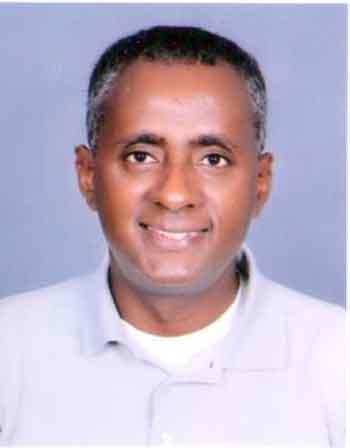Grantee Spotlight: Habtom Ressom, Ph.D. - Multi-Omic Approaches for the Early Detection of Liver Cancer
, by CRCHD staff
Each year, more than 12,000 individuals lose their lives to liver cancer. The disease is found more commonly in men than women, and affects African Americans more than non-Hispanic whites. The rate of survival (five years from diagnosis) is slim (only between 2-7%).
Habtom W. Ressom, Ph.D., NCI CRCHD R21 grantee at Georgetown University’s Vince Lombardi’s Comprehensive Cancer Center in Washington, D.C., is working to identify a method for detecting liver cancer early – with an ultimate goal to save more lives. With a background in electrical engineering, Dr. Ressom employs bioinformatic technologies (a collaboration of bioengineering, computer science, molecular biology, chemistry and mathematics) to collect, and make sense of, multi-omic data from liver cancer cases and patients with liver cirrhosis.
“There’s a lack of reliable biomarkers to detect liver cancer early,” Ressom says. He points to the challenge of disease heterogeneity as one reason. To find biomarkers, Ressom and his team evaluate the levels of various biomolecules (genes, proteins, metabolites, and glycans) in liver tissues and blood samples from a large number of subjects by using high-throughput omic technologies such as mass spectrometry, microarray, and next generation sequencing.
“The purpose of the CRCHD-funded R21 study is to see if we can detect liver cancer early,” Ressom said. “For example, if we have a blood sample form a patient with liver cirrhosis, and no cancer is detected, is it possible to determine if there’s a chance of early onset of the disease based on the levels of metabolites? Which metabolites can be used as biomarkers? How significant is the difference in the levels of these metabolites between liver cancer cases and patients with liver cirrhosis?”
Before joining Georgetown in 2004, Dr. Ressom was an Assistant Professor of Electrical and Computer Engineering at the University of Maine, where his work was focused in the use of artificial neural networks and fuzzy logic for analysis of large volume and high-dimensional data.
When asked about the impact of his R21 grant, Ressom responded, “CRCHD allowed me to get into metabolomics and systems biology research for biomarker discovery. I’m certain that if we can find additional biomarkers with improved sensitivity and specificity, we can detect liver cancer early and help save more lives.”
Dr. Ressom was born in Ethiopia. He earned his Ph.D. in Electrical Engineering from the University of Kaiserslautern, Germany, and his Master and Bachelors of Science from Addis Ababa University in Ethiopia. He is a senior member of the Institute of Electrical and Electronics Engineers (IEEE) and a Director of the Genomics and Epigenomics Shared Resource at the Georgetown Lombardi Comprehensive Cancer Center, and has authored over 140 scientific articles published in journals, conference proceedings, and books.
